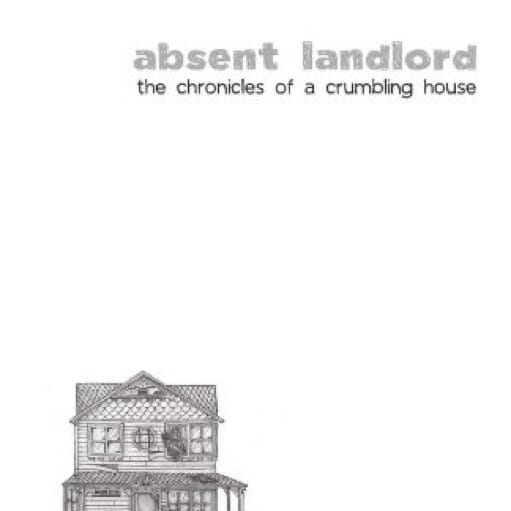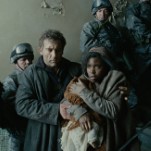absent landlord: the chronicles of a crumbling house by raw spoon (Ross Boone)
In this house, the rent’s not too high

An illustrator-turned-writer with a funny pseudonym—raw spoon—has something to say…something we need to hear. raw spoon (author Ross Boone, get it?) peoples a falling-down manse with characters who all need something from one another. A presence, if that’s the word, of a mysterious, benevolent absent landlord permeates the story, and spoon scatters clues to the landlord’s identity and existence amongst his pages.
Before the story draws you in, I predict you’ll pick up the book and (spoiler alert!) flip the lower right-hand corner pages with your thumb. You’ll see line drawings of a bearded man turn into a moving cartoon. You may also get pulled in by a back cover that advises:
Let this book sit silently on your shelf until a day comes when you have poured yourself out empty and received nothing in return. Then pick it up and read it quickly.
absent landlord delivers on the promise that the book will fill you up again. You won’t find the spiritual message it contains aggressive to the point of annoyance—it comes through the doorway subtly and predictably at times, comforting and funny at others. Characters swap hilarious, sometimes poignant, dialogue. We like Seth, the main character, but others in the house put us on full alert. We find them very human in their evil, their sloth and their bitterness over past mistakes. Their warts fascinate us most, in fact.
Line drawings bring to mind artwork in books by the late Shel Silverstein, most famous for his illustrated children’s book The Giving Tree. Like Silverstein, raw spoon’s art complements the written story, and he plays joyfully with the text in unexpected places. As in Silverstein, not everything in raw spoon’s story comes pretty.
As mentioned, raw spoon plays joyfully. The book’s first page instructs a reader to the last page to peruse a list of clues as to the landlord’s identity, complete with page references. Readers should, raw spoon suggests, cut the clue list from the book and fold it one of two ways—lengthwise for a bookmark or horizontally for a postcard. (Do not try this on your Kindle!) The author also invites reader interaction with his characters on Facebook … or to send him a message. (Spoiler alert No. 2: I contacted raw spoon via Facebook, and he did reply, quickly confessing he is, in fact, Ross Boone.)
He also rather pointedly on page 5 allows you space to “give” the book to at least four other people. Generosity? Unabashed self-promotion? Decide for yourself.
As Seth, who lives in the house and works in a local grocery store, ponders the mystery of the absent landlord, we gradually draw into his day-to-day concerns and interactions with peers in the falling-down house. No one in the house knows the landlord, his identity a central mystery of the book.
-

-

-

-

-

-

-

-

-

-

-

-

-

-

-

-

-

-

-

-

-

-

-

-

-

-

-

-

-

-

-

-

-

-

-

-

-

-

-

-








































